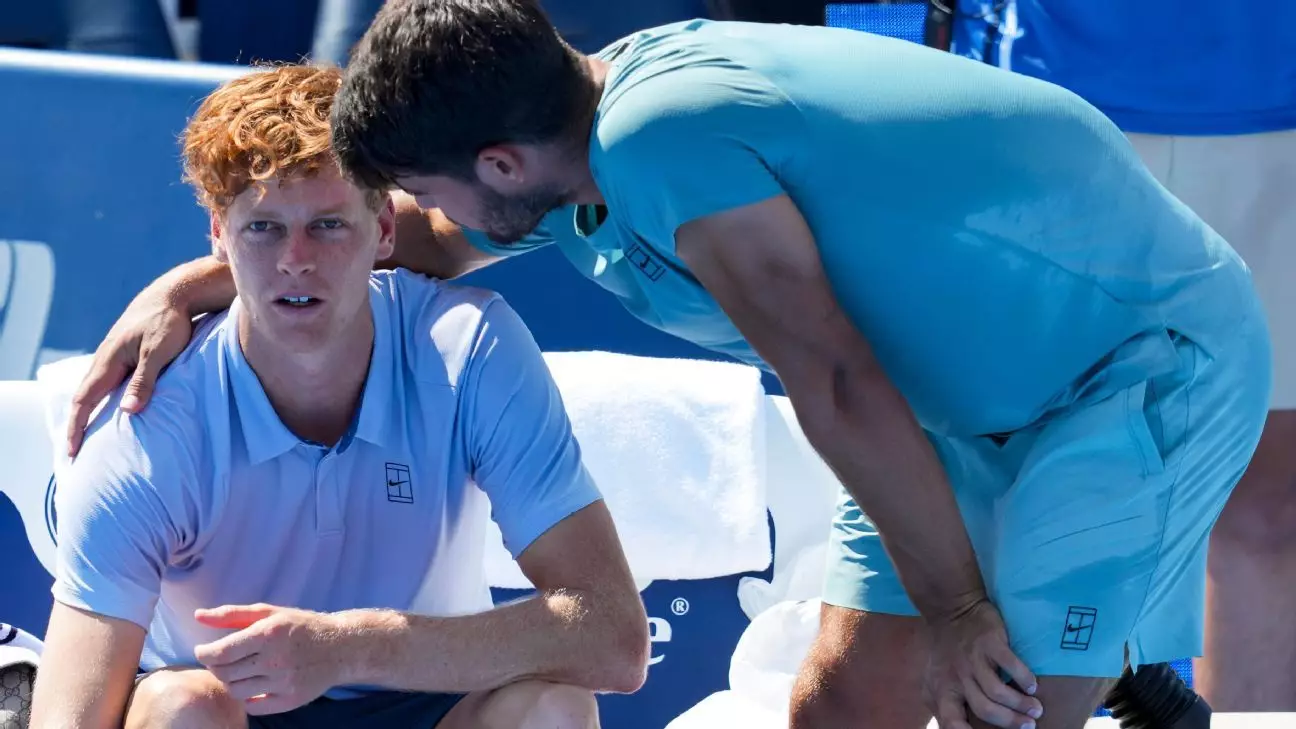The Cincinnati Open, an esteemed tournament often seen as a precursor to the US Open, delivered an unexpected and emotionally charged final that defied conventional expectations. The match’s culmination, heavily influenced by circumstances beyond the players’ control, underscored the unpredictable nature of sports—reminding us that victory is sometimes dictated not solely by skill, but by circumstance and resilience. Carlos Alcaraz’s ascent to the trophy was not only a celebration of his talent but also a testament to how opportunities can arise from adversity.
What initially promised to be a fiercely contested showdown between two of the sport’s brightest stars was abruptly transformed into a win by default when Jannik Sinner was forced to retire due to illness. In a sport renowned for its physical and mental demands, this occurrence raises critical questions about the importance of health, preparation, and the human element that often remains behind the scores and statistics.
Alcaraz’s Persistent Drive Triumphs Despite the Odds
Carlos Alcaraz entered the final with palpable determination, eager to affirm his position among the elite after narrowly missing out on titles earlier in the year. His victory, spurred by Sinner’s unforeseen health setback, was a showcase of resilience—a trait that defines true champions. Unlike a straightforward achievement, this triumph carries an undercurrent of emotional complexity. It became a narrative of seizing the moment when the universe unexpectedly granted him a pathway to victory.
Alcaraz’s words reflected humility and genuine sportsmanship. He acknowledged Sinner’s struggles and wished him well, exemplifying the respect that is integral to the spirit of tennis. His emotional post-match interview revealed that, beyond the trophy, what mattered most was the opportunity to showcase his skill and perseverance—traits that reinforce his reputation as a future legend in the sport.
Sinner’s Heartbreaking Turn and its Impact on the Sport
Jannik Sinner’s withdrawal from the final was a stark reminder of the fragility of athletic pursuits. The Italian player, riding a significant winning streak and on the cusp of defending his back-to-back titles, faced an abrupt halt to his momentum. His illness robbed fans of witnessing a highly anticipated rematch, a classic confrontation that had the potential to be legendary given their previous encounters.
More poignantly, Sinner’s situation highlights the importance of health and mental stamina. Athletes spend years building physical resilience, yet illness and injury remain unpredictable enemies. His encounter with illness mid-match underscores the importance for players to listen to their bodies—a lesson for both sports professionals and fans alike. The sports community must recognize the thin line athletes walk between peak performance and unforeseen setbacks.
Implications for the Future: The U.S. Open and Beyond
This outcome casts a different light on the upcoming US Open, the tournament that officially closes the hard-court season. Historically, Cincinnati winners have often gone on to claim Grand Slam titles, a trend that continues to reinforce its reputation as a critical stepping stone. For Alcaraz, this victory could serve as a catalyst—boosting confidence and establishing momentum ahead of New York.
Yet, the narrative surrounding Sinner’s health serves as a cautionary tale: physical robustness and well-being are crucial in maintaining consistency at the highest levels. His inability to finish the final raises questions about player fitness, preparation, and even the mental toll of relentless competition. As tennis continues to evolve, these incidents serve as stark reminders that even the most elite athletes are susceptible to the limits of human endurance.
Reevaluating the Dynamics of Tennis Rivalries
The match, albeit cut short, was a chapter in the ongoing rivalry between Alcaraz and Sinner—a rivalry that promises to shape the future of men’s tennis. Their history of intense matches, including high-stakes encounters on Grand Slam stages, elevates their battles beyond individual matches into a broader narrative of the sport’s next generation.
Sinner’s temporary absence from the final does little to diminish this rivalry but instead adds layers of complexity. It emphasizes how external elements, such as health and luck, can influence career trajectories and reshape competitive landscapes. For Alcaraz, the victory in Cincinnati is a chance to capitalize, but it also serves as a reminder that rivalry victories are ephemeral if the storyline is interrupted by circumstances beyond control.
In conclusion, the Cincinnati Open took a turn that no one expected, reinforcing the unpredictable, human side of professional sports. Alcaraz’s triumph, born in part out of opportunity and perseverance, exemplifies the resilience required to succeed amid chaos. At the same time, Sinner’s health scare prompts a deeper reflection on the physical and mental toll elite athletes endure to reach the top. In this sport, setbacks and victories are intertwined, shaping narratives that resonate far beyond the court.


Leave a Reply